AFTERILOVAISK.
Heorhiy Tykhyi and Ivan Liubysh-Kirdey
” I cannot understand how none of those rounds hit us. “
Heorhiy Tykhyi and Ivan Liubysh-Kirdey – journalist and cameraman who works at the ARD channel (Germany).
We had never worked in hot spots before 2014. We came (to Ilovaisk – editor’s note) together with the “Myrotvorets” battalion, were making a movie about them. We wanted to shoot not just redeployment, but also how they came to perform the task, how they built check points, how they took up some positions. We thought we came (to Ilovaisk – editor’s note) for half a day, but stayed there for six days. I understood that it was impossible to take the city with that number of fighters.
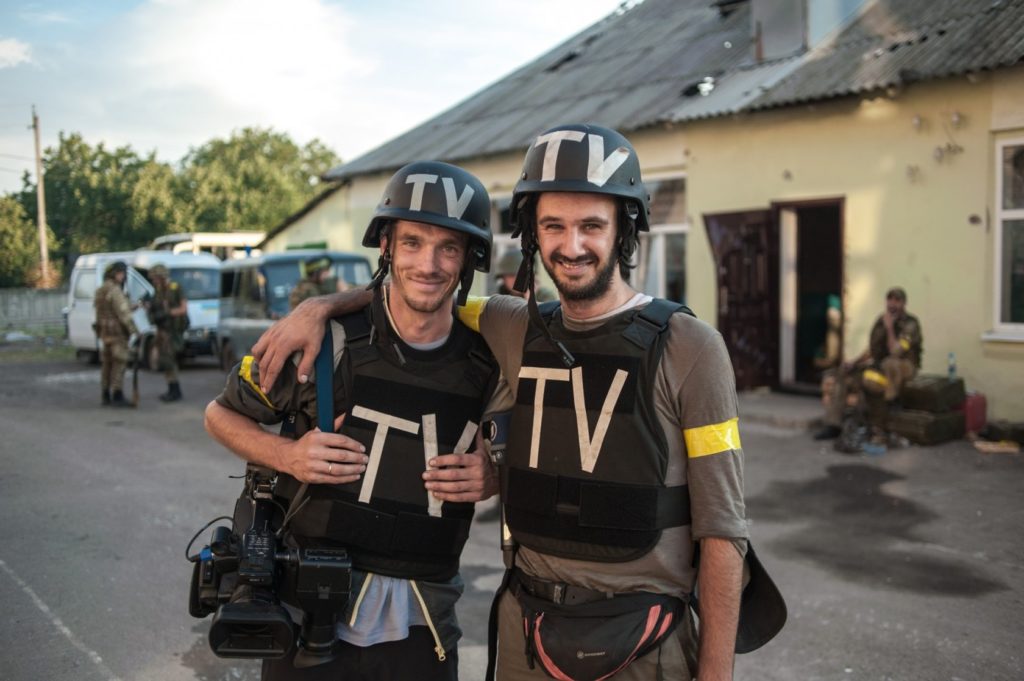
Hosha [shortened from Heorhiy]: Before the war I was on the Maidan. I was working as a journalist, just as I am now. When the protests began, I was still working in the Ukrainian media, namely on Savik Shuster’s program. In December 2013, it was closed. For a month I was unemployed, I was a “drop” in the sea of people on the Maidan. And in late January 2014, I was invited to German television ARD – my English came in handy there for the translation of interviews. Later I stayed there to work as a freelance producer. Together with the ARD, I was witness to the worst days of the Maidan, the escape of Yanukovych, the annexation of the Crimea, the beginning of the war in the East, the MH17 tragedy, Ilovaisk, and everything until this day. This was a truly scary and historic time for Ukraine.
Probably like most people, we got to Ilovaisk by some hellish coincidence. Of course, we did not plan to spend almost 6 days in a sieged city where street fights were underway and to be leaving it under fire. In fact, we were shooting with a “Myrotvorets” volunteer battalion since Dzerzhynsk, where they were garrisoned in mid-August. Then it became known that the battalion was about to be redeployed. There were rumors that the guys would be redeployed to Ilovaisk, but no one knew this for sure. We accompanied the fighters and shot our stories. When the battalion moved to Komsomolsk, we already saw the light from artillery bombs somewhere in Ilovaisk at night.
Late at night, or almost early in the morning, we were told that the fighters were ordered to perform a small task and could take us with them. Ivan and I decided to go. We did not know that on the same night, thousands of Russian troops were crossing the border to close Ilovaisk off. In the morning we reached the “first” checkpoint on the outskirts of Ilovaisk. It was there that we realized where the battalion was heading. Nevertheless, having consulted with each other, we decided that the story would be incomplete, if we turned around and went back. So we drove into the city. Along the destroyed streets, past the tired fighters from the “Donbass” and “Dnipro-1” near the school, and to the railway depot.
And it so happened that we, in fact, got into a closing trap. This window closed behind us, right behind us, on the same day, it was Independence Day, August 24.
There was almost no Internet connection. It took me about 40 minutes to download Twitter feed. There were many panic messages about Russian troops that had crossed the border. At first I did not believe this, “fear makes the wolf bigger than he is”. But then it turned out to be true.
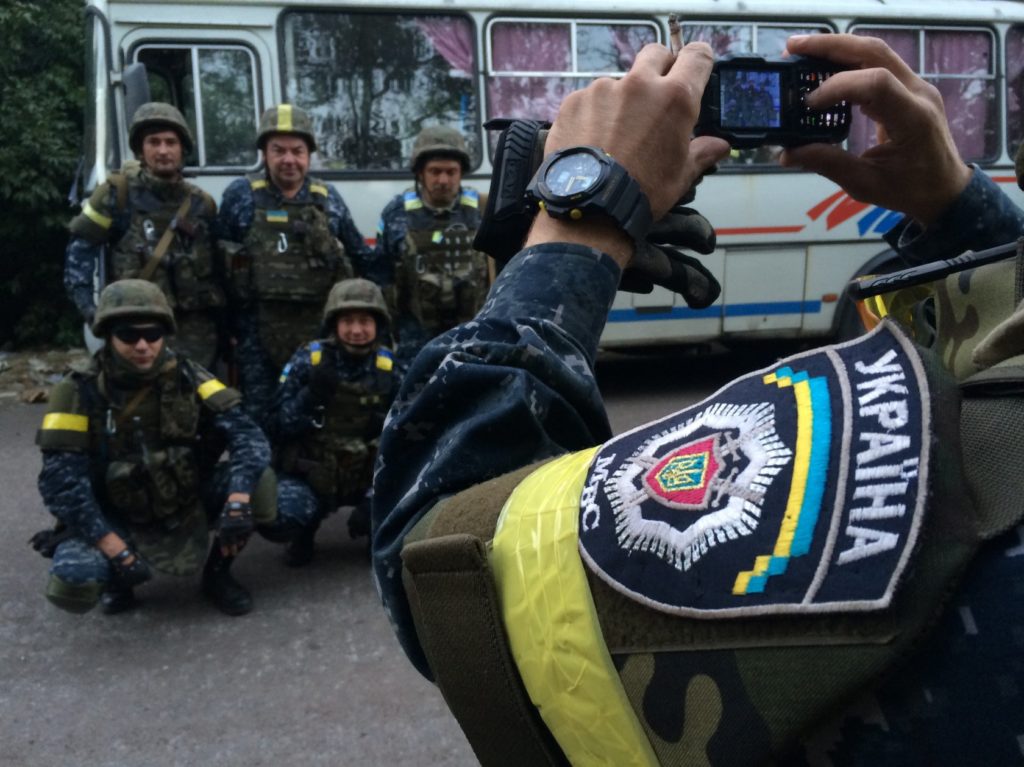
Ivan:
In fact, the guys from “Myrotvorets” were seasoned. And when we entered the depot, there was already “Kherson” and “Svityaz” (battalions – editor’s note) there. Our first impression was like in the Russian propaganda film The 9th Company. When they brought new ones to Afghanistan, the seasoned ones had already been there. They were dirty and were smoking lazily; and judging from their appearance, I realized that they had gotten through shit before.
There were canned meat leftovers and bread crumbles on the floor, some sleeping mats, someone was sleeping, a sniper was firing, and no one paid attention to this – it was surreal.
I understood that it was impossible to take the city with that number of fighters.
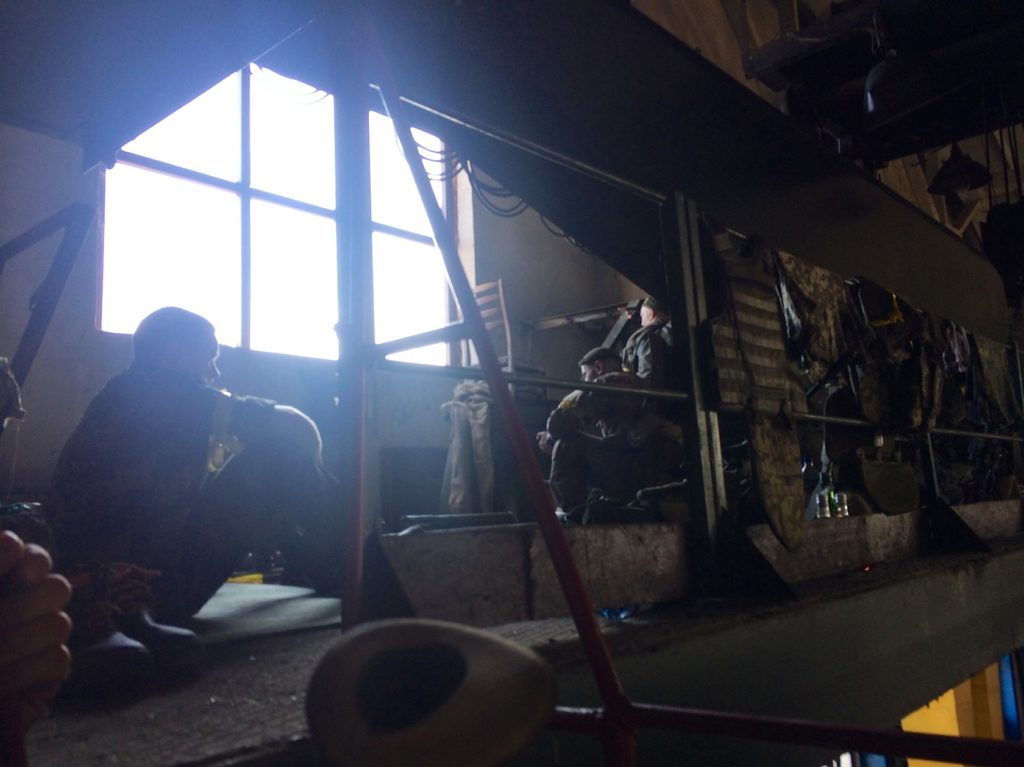
Hosha Tykhyi:
And there was also a very strong first impression of how we were looking for a place to sleep at the depot. For our first night. We came to the war as guys from the glamorous Kyiv. And it turned out that this was not a 5-star hotel. We found a ChME3, a green shunting train. A square one. All the “VIP places” were occupied at that time. There was an awesome electric train with compartment cars, but all of them were occupied. Ivan and I were left with a shunting train. We found a pantry with railroad clothes. Different warm jerseys. We understood that those were not our clothes, but what choice did we have in such circumstances? It was cold at night. We took two coats and some pants. We lay them on the floor in the cabin and were happy to be so well sheltered from shelling.
In fact, it is something unreal.
Ilovaisk is a city divided by a huge railroad. A railroad which has 15 or 16 tracks. At that time, the border of the city was actually on that railroad. That is, there was already DNR territory behind this railroad, whereas the Ukrainian one was before it. And the depot was just on the borderline. It was a huge building, a gigantic one. I cannot understand how “Kherson” and “Svityaz”, which together had 30 soldiers, managed to capture this depot and hold it for a day or two. The guys from “Myrotvorets” came to provide reinforcement.
I was awoken by an explosion which was caused by a projectile, which apparently fell in the school yard, and sand started falling on us, the whole school building started shaking.
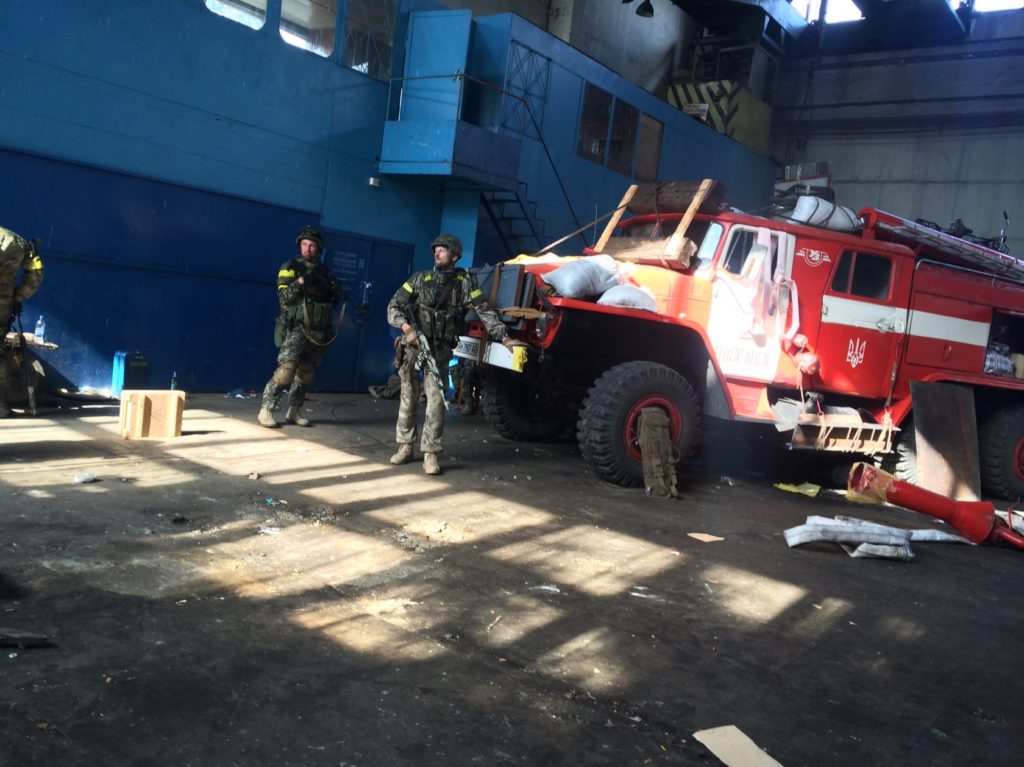
Ivan:
I absolutely had no feeling that I was going to a real war, no feeling at all. It seemed to me that it would be another visit to a city, that they would once again place ammunition, we would take several shots of them there, that everything would be calm and peaceful. And that we would just go back. We drove south, picking all the batteries that were still working.
For me, the serious horror began after Heorhiy and I came to school, on the next day. We spent one night in the depot, and the next day we asked the guys to take us to the school – where the command post was located – on their KAMAZ. We planned to somehow get out of the city there. So, speaking about the second night at school: I was awoken by an explosion which was caused by a projectile, which apparently fell in the school yard, and sand started falling on us, the whole school building started shaking. This is when I already felt that it was a “true” war with possible consequences. And then it was scary to go outside.
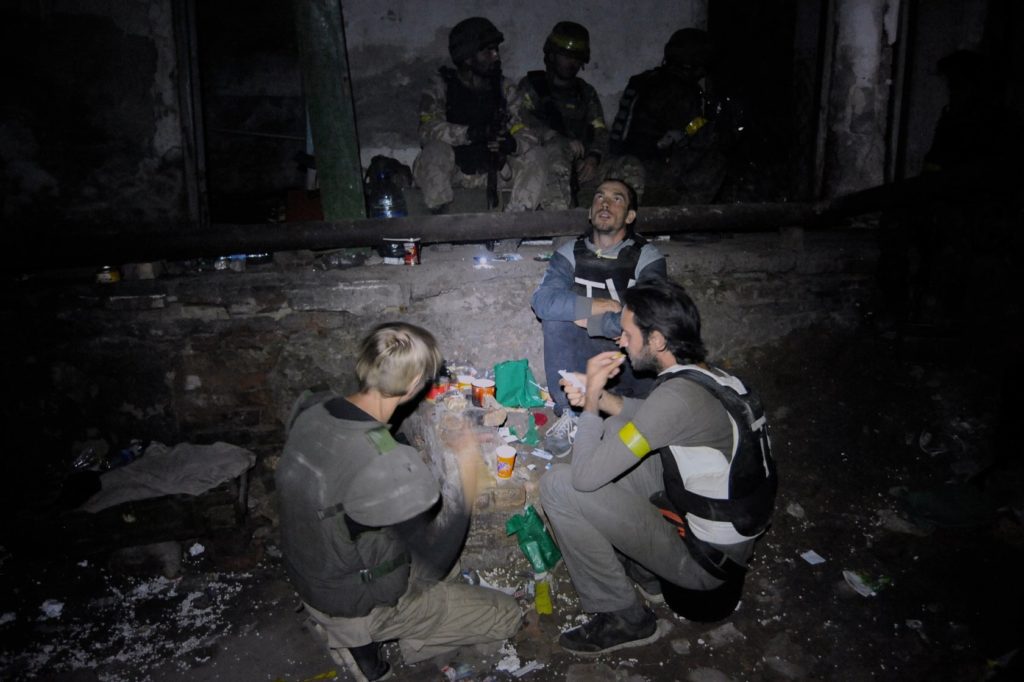
Hosha Tykhyi:
I remember really well the advice given by Filin (commander of the “Donbass” battalion – editor’s note). After Semenchenko was wounded, he was actually the commander of the group in Ilovaisk. He gathered the fighters around him and said the following words,
“Remember, you must always be scared. Constantly. This feeling of fear will disappear at some point, and it is the most dangerous moment. I already have a lot of fighters who think they are superheroes. They already got into such a hot water… And they are not scared. It is such people that are usually killed. So always be scared. If you hear a whistling noise, immediately lie down on the ground. Someone near you will definitely not lie down and will be standing and laughing. They may be making fun of you, but you will stay alive.”
And this really helped. Many times. When you are constantly in intense combat, surrounded by different sounds, at some point you stop responding to this. You don’t even turn your head. Because it becomes so commonplace.
This is an extreme psychological pressure, and you need to constantly talk to each other. Talk about anything, about the color of the nearest wall. Discuss any topics.
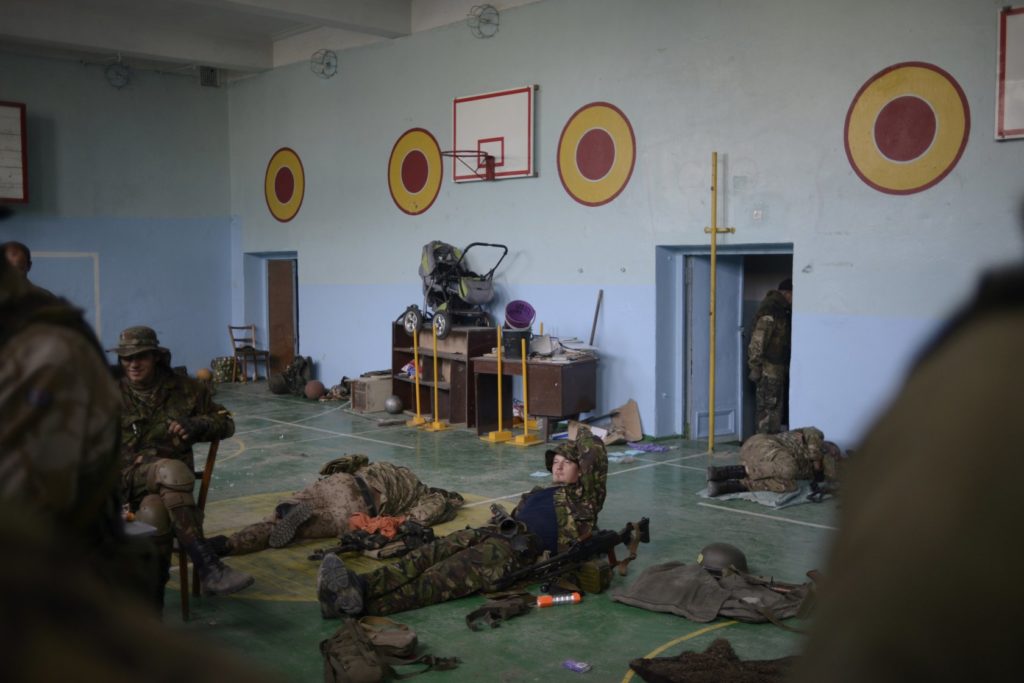
Another helpful tip was given to us by the deceased Taras Brus (a fighter from “Dnipro-1”). It so happened that we almost took his place for the night. He came, and we moved. We started talking with Taras. He was actually a very good man. He was smart, calm. Had really great experience. And he gave us advice, “Guys, you have to talk here all the time. This is an extreme psychological pressure, and you need to constantly talk to each other. Talk about anything, about the color of the nearest wall. Discuss any topics. Even if you do this by rote, just keep talking. If you stop talking, 5-10 minutes will pass, and you will be done. Because you will immerse yourself in bad thoughts, very bad thoughts. And it is hard to get out of there.” This really helped.
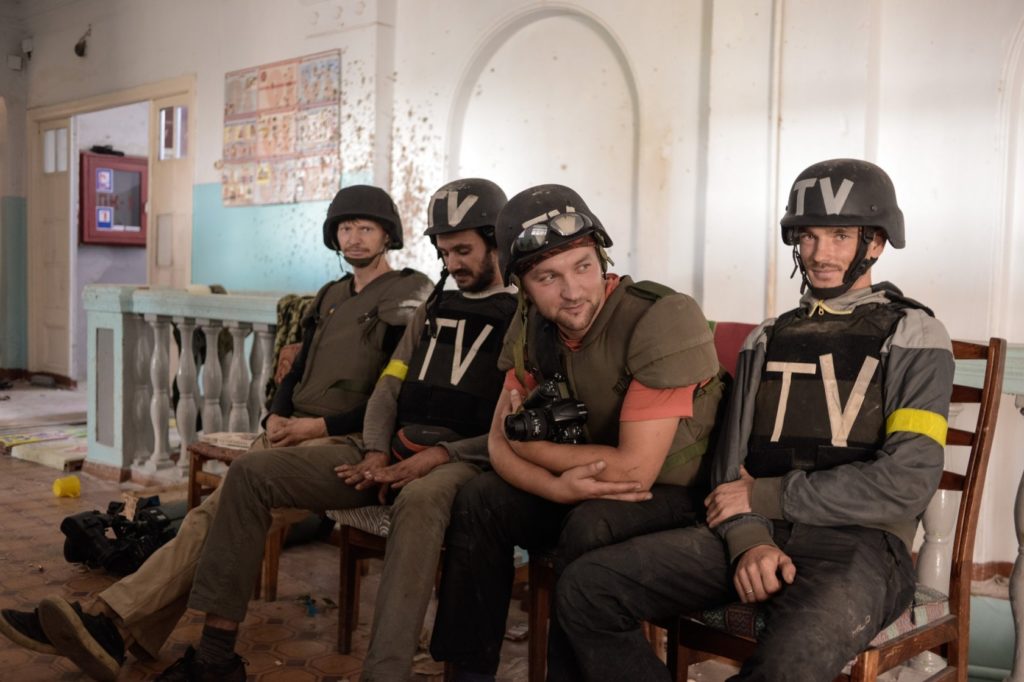
Ground floor of Ilovaisk school,
August 26, 2014. Photo: Yuri Mikhalsky “MISHKA”, “Donbass”
Hosha Tykhyi:
In fact, on the 3-4-th day it became clear that no one was leaving Ilovaisk and that it was definitely a complete encirclement. We missed the last column with the wounded, which had left on August 26. To tell the truth, there were fighters who were creating an atmosphere of panic. There were also “fighters” who really did not go out, who were in sheer panic. Well, it is understandable. Really. People were not ready for such a tough situation. “That is all, we are all done! They will just shoot us here; we will never get out of here.”
I remember a moment which was critical for me, when I almost fell asleep, and I had a hate attack. For some reason I was thinking about Putin, even though it is ridiculous. This happened twice. The first time this happened was on November 30, when the students were beaten. It was an uncontrollable attack of internal hatred. I imagined how I was smashing Putin’s head against the wall. And after that I was in such a state as if it was not me, like it was some movie. It was scary, it was as if I dissolved, as if I was looking at all of this from the outside. I got very scared, because in such a difficult situation you need concentration, and you just – bam! – and abstracted. You just abstracted from basically everything that was happening.
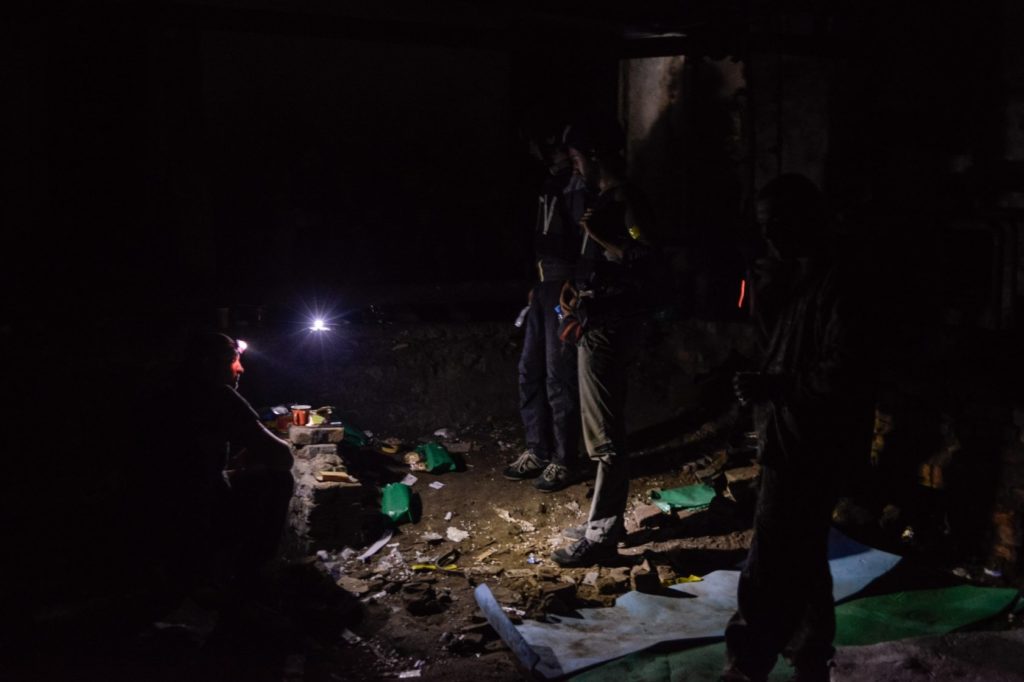
Hosha Tykhyi:
I also remember very well the story about how similar things that happen in life are to the things that are shown in movies. The reality and cinema are sometimes not at all different. It was around lunch time. The August heat, the flies were flying, there was such an intense silence. There was shelling shortly before, a morning one, a day one. And for about an hour, there were no sounds at all, it made everyone feel very tense. And one of the fighters lifted a cardboard box with something heavy and started carrying it, from the other side of the gym. He was carrying it extremely slowly, since it was heavy and he had to carry it through the entire gym. The wounded lay there, commanders were sitting there, someone was resting, someone was cleaning weapons. In this silence, in this August heat. He was carrying-carrying-carrying. But the box was bad, and at some point the lower part opened, and a porcelain plate fell out to the floor and broke. In this silence, we heard this boo-boom! Everyone jumped to their feet because of the loud sound, we thought that the shelling started. I looked at this and said jokingly, “this is a sign of good luck!”. And everyone started laughing. Thirty seconds passed, and an extremely fierce shelling began. We did not have enough time to get to this pantry.
If I were a screenwriter or a director, how would I show the tension people feel at war? I would shoot such a scene. It sounds like Hollywood, but it was happening before our eyes.
Do you remember how we were told to help carry some bag? And we were carrying some bag across the school and asked, “what kind of a bag is that?” “Well, these are “Mega’s” things (a fighter with a codename “MEGA”, who was killed during a mortar shelling). He was killed.” And we had been interviewing him near a KRAZ shortly before. He stood there so fearless, boasting, “what encirclement are you talking about, I do not fear anything, everything will be fine.”
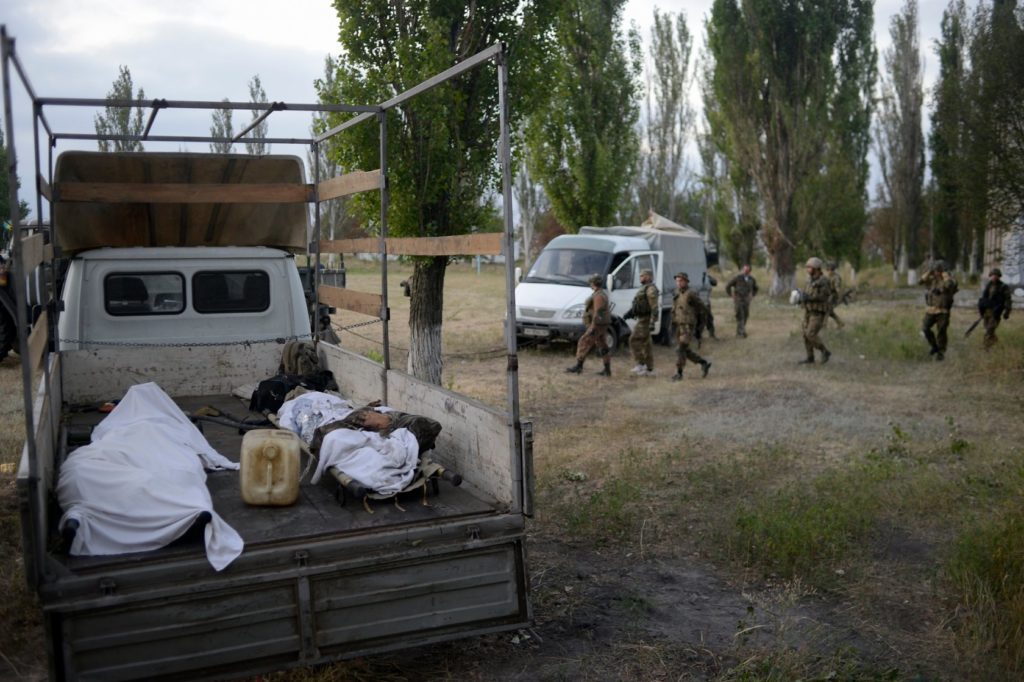
August 29, 5.40 am. Photo by Maks Levin
Without any sound, without any explosions, I saw how the field exploded completely. And as far as the eye could see, up to the horizon, there were shell craters in the ground everywhere.
Hosha Tykhyi:
We tried to leave on August 28, behind a column with the wounded. There was still hope that the wounded might be released from the encirclement, because there seemed to be some kind of an agreement. We had left to Mnohopillia – the suburb of Ilovaisk – shortly before, there was a field hospital there. The column tried to leave the city, was shelled, and was forced to return to the hospital. We were forced to spend the night in Mnohopillia. It was actually pretty scary there, because there was no basement. There was only a corridor where we slept. Everyone was ordered to switch off their phones and remove batteries, there was extreme secrecy.
The next morning, we lined up in a column, which consisted of hundreds of cars, at the town exit; the column was very long, and everyone was waiting for an order to move. I remember how tense the atmosphere was, because we were second to last in the column. And behind us, there was a military man in some truck. He started yelling that we should have been last instead of him. This fear is easy to explain – the last and the first car in the column are always shelled. The Russians learned to do this in Chechnya. That is, you shoot at the first and the last car, and the entire column stops, since the cars are blocked and can neither move back nor forward.
We stood there waiting for our departure. An hour passed, two hours passed, we were waiting for a very long time. Ammunitions exploded behind the forest – they were blown up, so as not to give the enemy an opportunity to get hold of them. And then mines started exploding, somewhere near this column. One, two, three. The sound was getting closer, closer, closer.
I remember clearly the moment when we started moving, because it was a completely spontaneous reaction. Well, of course, the military had an order. We did not know anything. I remember this moment, how tanks started at full speed, how they just pranced. And the horror started, a chaotic movement. The whole order of the column was lost, we started drawing closer to big cars and leaving that rural street with small houses and heading into an open field.
The toughest moment I remember was when we were coming into an open air. And as far as the eye could see, there was an endless field, all we saw was wheat or sunflowers. The windows in our car were closed, and the engine was roaring, we were moving fast, that is, we did not here any sound from the outside. But I remember a really apocalyptic picture: without any sound, without any explosions, I saw how the field exploded completely. And as far as the eye could see, up to the horizon, there were shell craters in the ground everywhere.
Ivan:
Unfortunately, I did not film one episode that was only left in my memory. I was extremely annoyed that I could not adjust my camera, and it was constantly turning off.
A tank or an armored personnel carrier was in front of us, I do not remember exactly. It was a huge armored vehicle. And a shell was fired into its tower. The tower began to turn into our direction. And dark smoke started to coming out of this car, so we just drove into this black smoke. I thought that something would just smash our car there, and this would actually be the end, and we would just say hello to God. But somehow we drove on.
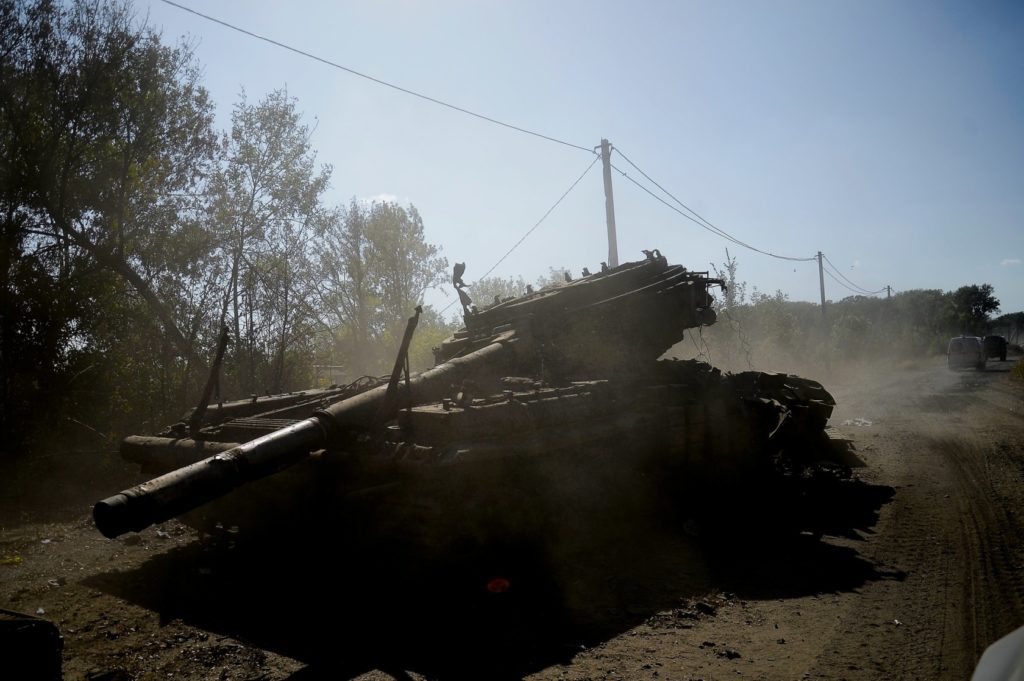
We approached some checkpoint near a gas station. We were glad to see our men. But when we got closer – the distance between us was probably 20 meters – we saw a St. George’s ribbon on the shoulder of one of the military men.
Hosha Tykhyi:
It looked as follows: Ivan leaned down, because everything was whistling and banging. Our jeep was flying at a frightening speed through all the pits. Ivan leaned down and was just holding his hand in the air. His hand was holding a camera which was sticking under the roof of the car and he was shooting everything that was happening around; I will remember this moment for the rest of my life.
There was still a very phantasmagoric mise-en-scene during the departure. We were using a gps-navigator in which a female voice was used. There was a terrible shelling in front of us, there was a real hell around, and in the background we were hearing a voice saying, “In three hundred meters turn right. Move straight…”
The departure itself lasted for about 20 minutes, there were a couple of ambushes that we got into, but when I start thinking about all of this now, everything is like a dream. I cannot understand how none of those rounds hit us.
In fact, they did: bullets hit our radiator, hood, wheels, one got stuck in the driver’s side door, it stopped 20 centimeters away from my helmet. The likelihood of all of us being unscathed after all of this was probably a percent or less than a percent.
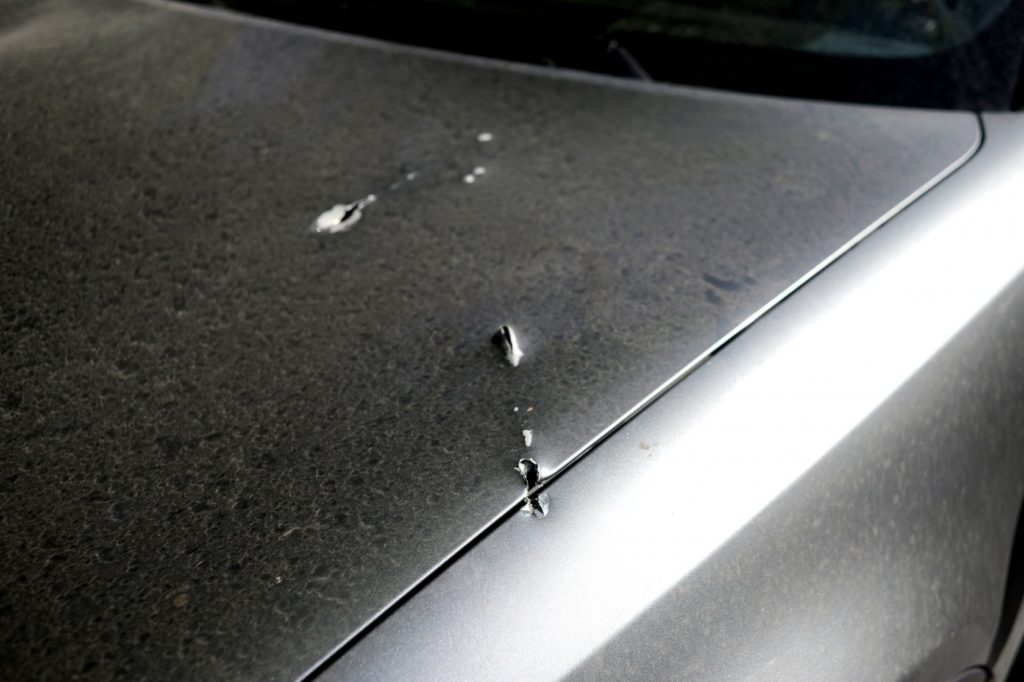
Hosha Tykhyi:
I remember how after the last ambush I leaned down to minimize the space I was occupying and heard the glass breaking in the car. Then I thought it was the end. It was like in a movie: the next moment you open your eyes and realize that the engine is still buzzing and the car is moving forward.
We overtook the entire column and were ahead of the first strike group. We came across a hostile armored personnel carrier, and we even have a video of Max waving at them, saying hello. There were no markings on our car, it was just a cool car driving past. And this armored personnel carrier let us go, they did not shoot. The road was open, but we did not know where to go. In the ATO reports it was said that Dokuchayevsk was controlled by Ukrainians, but could we believe this information?
We approached some checkpoint near a gas station. We were glad to see our men. But when we got closer – the distance between us was probably 20 meters – we saw a St. George’s ribbon on the shoulder of one of the military men. Max floored the car, and we rushed past them. We were very close and I remember the look on the face of this DNR man, who did not even seem to understand what happened; he did not shoot at us when we were mowing away.
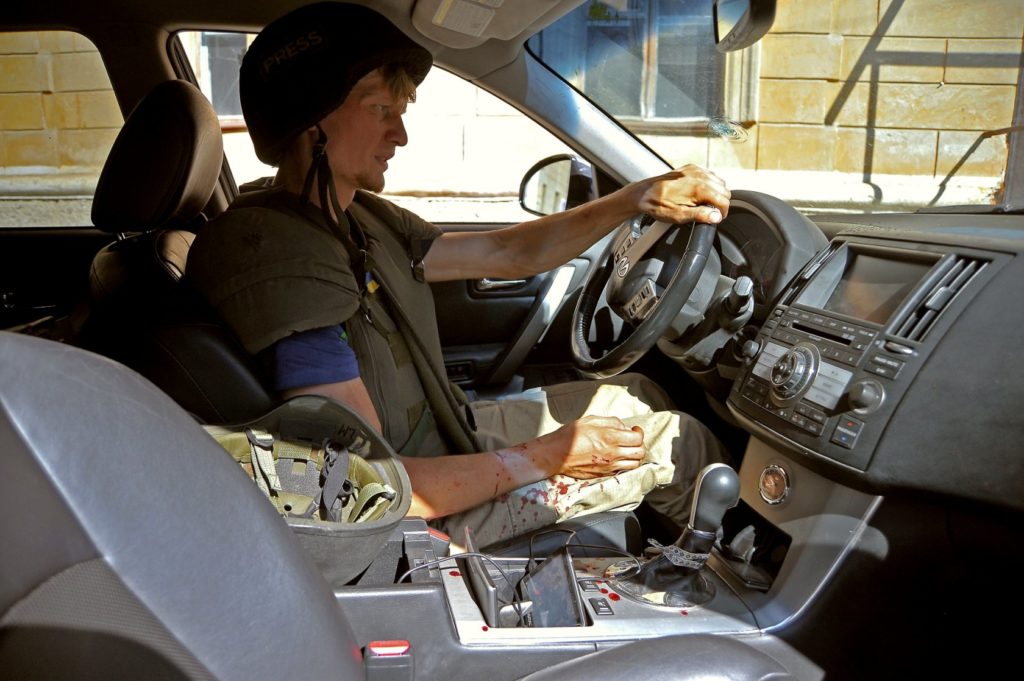
Hosha Tykhyi:
We were trying to figure out where to go next, asked people, but had no information. At that point we tried to call everyone we knew in Kyiv – our friends, parents, Parubiy’s acquaintances – in order to tell them what was happening here. It was such a panic moment, an emotional move. Then Anya Murka – a doctor, whom I had given my phone number shortly before – called me. She called to say that she had been wounded and that there were many other wounded and asked for help. But there was no way we could help. The next time we saw her was already in Kyiv.
Finally, some local man came with us and told us how to get to Dokuchayevsk, which turned out to be a “gray zone” at the time, that is, it was not controlled by either party. We came into the town and I wanted to smoke really badly, so I hobbled to the local market: I had a fungal infection on my feet, and it was very difficult to walk. I was wearing a bulletproof vest and a helmet and was covered in dirt. I was approached by local women who began to ask what had happened. At that moment, I still didn’t realize whether I was really alive or it was all just a dream. I started telling them that a lot of military men had been shot in the corridor. They started crying. This is a terrible memory.
After that we went to Volnovakha. We sat in some cafe and ordered shashlyk and salad, but could not eat. This is, actually, where these photos of lucky us hugging after the departure were taken. At that time, the fighting in Ilovaisk was still underway.
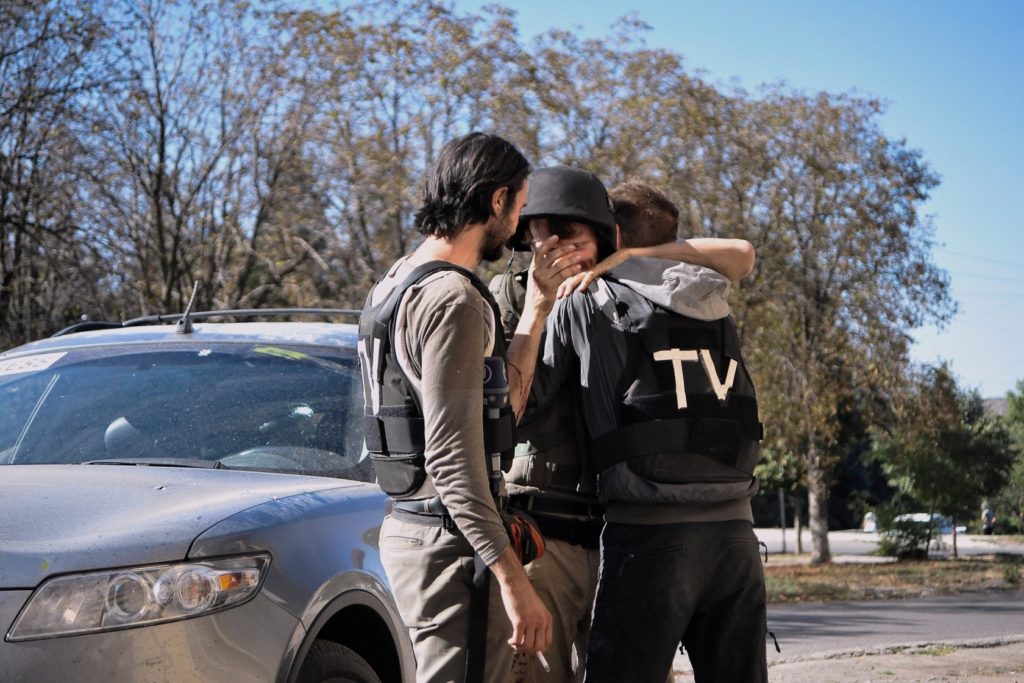
In 2016-2017, on the other hand, I see calm people with a lot of combat experience, who understand what they are doing here, who are very professional; the majority of them work under a contract.
Hosha Tykhyi:
We left Ilovaisk and shot footage for 2 documentaries. The first 15-minute movie was aired on September 2 on German channel ARD, in prime time, 3 days after our return. More than 4 million Germans watched it. In this movie, we directly stated that there was a Russian invasion into Ukraine, the encirclement of Ilovaisk, and the shelling of the corridor. This greatly influenced public opinion in Germany, where the war had been previously considered to be a local conflict between Kyiv and Donetsk.
The second, 45-minute, movie entitled Putin’s Army in the Ukrainian War was aired on October 10. That is, the emphasis was placed.
Yes, for a while it seemed that I would not go to the East again. It was the first emotional thought, which was a result of the fear I had experienced. But I could not just sit and not go there; perhaps, I was just brought up like this, or this is connected with my profession. However, our trips are rather ad hoc now. We go there when there is an opportunity, but it is less often than during the exacerbation.
Frankly speaking, international media’s interest in the events in Ukraine has decreased: in Germany, the migrant crisis has begun; elections and domestic affairs are on the agenda, and our front line is the same, the situation is not changing significantly.
I would like to add that our army has changed a lot since then. In 2014, I saw extremely motivated and patriotic guys who did not know what the war was, did not understand what to expect, and did not have the necessary uniforms. In 2015, I remember seeing a lot of drunk people, sometimes it was hard to find someone who was sober. In 2016-2017, on the other hand, I see calm people with a lot of combat experience, who understand what they are doing here, who are very professional; the majority of them work under a contract.
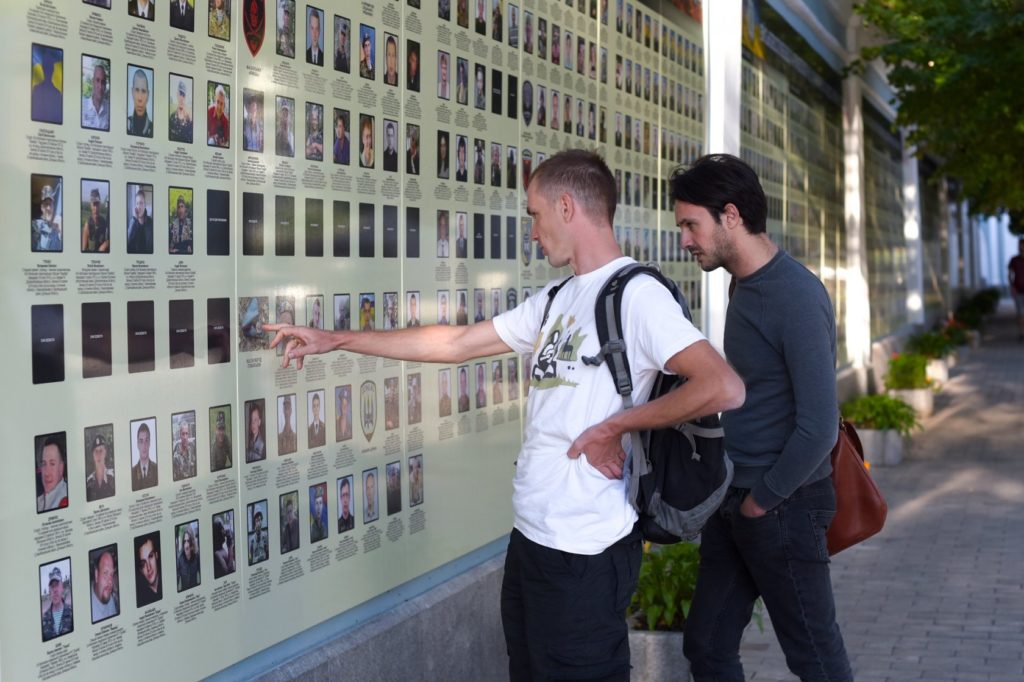
Hosha Tykhyi:
However, the army is now much more closed when it comes to the work with journalists: they have come up with a two-tier accreditation, and are creating bureaucratic obstacles. It happed once that we had already shot everywhere, almost reached separatist positions, but could not get the press secretary’s permission to receive a brief comment from a fighter who would say that there was no truce. He explained this as follows, “Oh, no, you have a blue card (not pink, which is the second tier of accreditation – editor’s note)”
And we could not explain that a foreign channel’s camera was important to him personally. In an army which is not moving, this bureaucracy grows. In addition, there are colleagues who work unprofessionally, and this gives the Ministry of Defense an opportunity to introduce some new restrictions. We go there mainly through personal arrangements. I get in a car to health professionals, to volunteers, to the military, who say, “we know this guy, come with us and shoot.” They trust me.
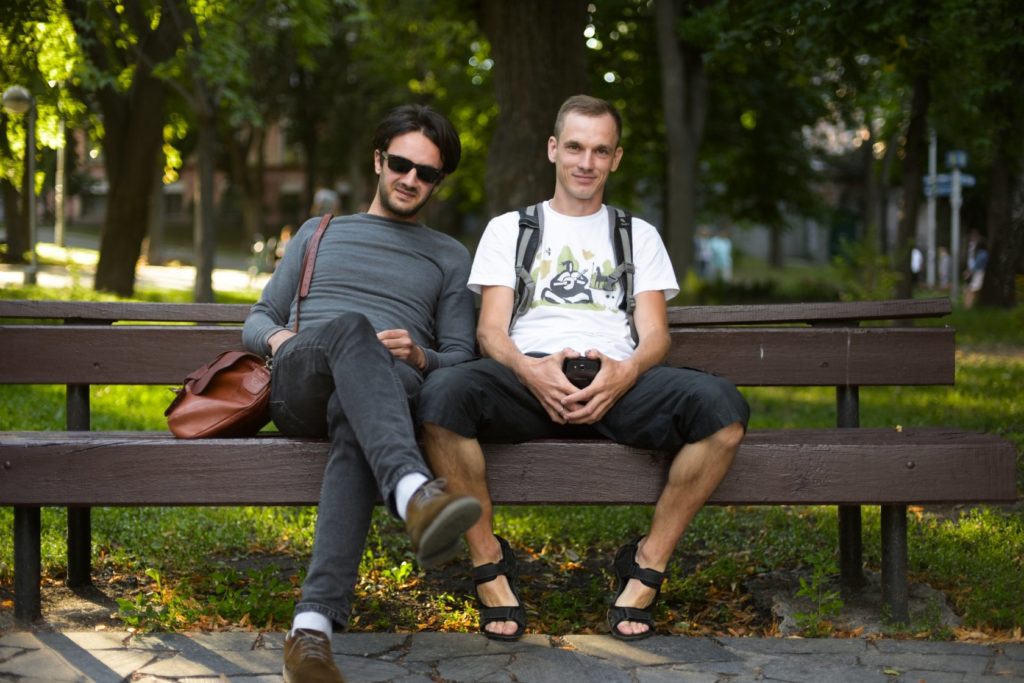
Kyiv, Vladimir Hill, June, 2017. Photo: Markiian Lyseiko

